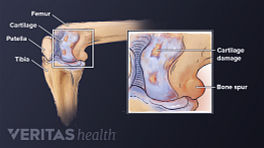Research has shown that advanced age, excess body weight, tobacco use, and decreased bone density (osteoporosis) can affect knee replacement surgery outcomes. In most cases, patients with these conditions can still have knee replacement surgery, but the patient and surgeon may need to:
- Make special efforts to prepare for surgery. For example, smokers may be discouraged from having surgery until they can quit or cut back on the number of cigarettes they smoke each day.
- Adjust expectations. For example, people in their 80s may expect to stay in the hospital a day or two longer than younger patients.
Below are descriptions of how smoking and other tobacco use, age, weight and bone density can affect knee replacement surgery.
Smoking and Other Tobacco Use
Smokers and other tobacco users have a higher risk of medical complications as well as a higher risk of having a second knee replacement surgery (called a revision surgery). 1 Kapadia BH, Johnson AJ, Naziri Q, Mont MA, Delanois RE, Bonutti PM. Increased revision rates after total knee arthroplasty in patients who smoke. J Arthroplasty. 2012;27(9):1690-1695.e1. To lower risks after surgery, tobacco users are encouraged to quit or cut back on their habit. Research suggests that quitting tobacco use 4 to 8 weeks ahead of a knee replacement surgery can significantly lower the risks from smoking. 2 Eka A, Chen AF. Patient-related medical risk factors for periprosthetic joint infection of the hip and knee. Ann Transl Med. 2015;3(16):233.
See Scheduling vs. Postponing Knee Replacement Surgery
Advanced Age
People who undergo knee replacement in their 80s experience the same rates of pain relief as younger patients. 3 Cher EWL, Tay KS, Zhang K, Tan SB, Howe TS, Koh JSB. The Effect of Comorbidities and Age on Functional Outcomes After Total Knee Arthroplasty in the Octogenarian: A Matched Cohort Study. Geriatr Orthop Surg Rehabil. 2018;9:2151459318769508. , 4 Kennedy JW, Johnston L, Cochrane L, Boscainos PJ. Total knee arthroplasty in the elderly: does age affect pain, function or complications?. Clin Orthop Relat Res. 2013;471(6):1964-9. However, certain risks do increase with age.
Researchers who examined 22 clinical studies found that people over age 75 who underwent knee replacement surgery had a longer average hospital stay and a higher risk of heart attack and deep vein thrombosis compared to patients younger than age 65. 5 Kuperman EF, Schweizer M, Joy P, Gu X, Fang MM. The effects of advanced age on primary total knee arthroplasty: a meta-analysis and systematic review. BMC Geriatr. 2016;16:41. The researchers noted that, though these differences were statistically significant, the increased risk was relatively small.
See Total Knee Replacement Risks and Complications
Another research study found that older patients tend to have longer hospital stays and a greater risk of complications, including death (death rates are between 1.1% and 1.5% for people in their 80s and between 2.6% and 2.9% for people in their 90s). 6 Murphy BPD, Dowsey MM, Choong PFM. The Impact of Advanced Age on the Outcomes of Primary Total Hip and Knee Arthroplasty for Osteoarthritis: A Systematic Review. JBJS Rev. 2018;6(2):e6.
Excess Weight
There are no weight limits regarding who can have knee replacement surgery; however, obesity does carry extra risks of complications, such as infection. Moreover, obese patients tend to experience less post-surgical pain relief than non-obese patients. 7 Pozzobon D, Ferreira PH, Blyth FM, Machado GC, Ferreira ML. Can obesity and physical activity predict outcomes of elective knee or hip surgery due to osteoarthritis? A meta-analysis of cohort studies. BMJ Open. 2018;8(2):e017689. When possible, overweight patients are encouraged to lose weight prior to surgery. Some surgeons will have a cut off based on body mass index for when they would do a knee replacement surgery for obese patients.
Diabetes
Many people considering a joint replacement also have type II diabetes. Patients known to have diabetes will be asked to have their blood’s hemoglobin A1C tested before surgery.
Blood glucose levels should be well controlled before and after surgery. Research shows that patients who have high glycemic variability after knee replacement surgery are more likely to need extra time in the hospital, and they are also at increased risk for joint infection, surgical site infection, and death within the first 3 months after surgery. 8 Shohat N, Restrepo C, Allierezaie A, Tarabichi M, Goel R, Parvizi J. Increased Postoperative Glucose Variability Is Associated with Adverse Outcomes Following Total Joint Arthroplasty. J Bone Joint Surg Am. 2018;100(13):1110-1117.
Some researchers recommend that everyone scheduled for a joint replacement be tested for diabetes first. These researchers conducted a study of 1461 patients scheduled for joint replacement and found 123 (8%) had undiagnosed type II diabetes. 8 Shohat N, Restrepo C, Allierezaie A, Tarabichi M, Goel R, Parvizi J. Increased Postoperative Glucose Variability Is Associated with Adverse Outcomes Following Total Joint Arthroplasty. J Bone Joint Surg Am. 2018;100(13):1110-1117.
Bone Density (Osteoporosis)
Osteoporosis is not a contraindication for knee replacement surgery, however, it may affect how a surgeon plans for surgery. For example, a surgeon may be required to use a stemmed prosthesis in addition to bone cement to attach the new prostheses to the existing bone. A stemmed prosthesis would include a portion that would go deeper into the bone to help with stability.
See Cemented vs. Cementless Alternatives in Joint Replacement
If a person has severe osteoporosis or has had stress fractures, a surgeon may want the patient to take steps to improve bone density before knee replacement surgery. Osteoporosis treatment may continue after surgery to enhance the lifespan of the knee replacement.
Patients considering knee replacement surgery are advised to talk to their doctors about how age, weight, diabetes, tobacco use, osteoporosis and other factors that may affect their individual risks and post-surgical outcomes.
- 1 Kapadia BH, Johnson AJ, Naziri Q, Mont MA, Delanois RE, Bonutti PM. Increased revision rates after total knee arthroplasty in patients who smoke. J Arthroplasty. 2012;27(9):1690-1695.e1.
- 2 Eka A, Chen AF. Patient-related medical risk factors for periprosthetic joint infection of the hip and knee. Ann Transl Med. 2015;3(16):233.
- 3 Cher EWL, Tay KS, Zhang K, Tan SB, Howe TS, Koh JSB. The Effect of Comorbidities and Age on Functional Outcomes After Total Knee Arthroplasty in the Octogenarian: A Matched Cohort Study. Geriatr Orthop Surg Rehabil. 2018;9:2151459318769508.
- 4 Kennedy JW, Johnston L, Cochrane L, Boscainos PJ. Total knee arthroplasty in the elderly: does age affect pain, function or complications?. Clin Orthop Relat Res. 2013;471(6):1964-9.
- 5 Kuperman EF, Schweizer M, Joy P, Gu X, Fang MM. The effects of advanced age on primary total knee arthroplasty: a meta-analysis and systematic review. BMC Geriatr. 2016;16:41.
- 6 Murphy BPD, Dowsey MM, Choong PFM. The Impact of Advanced Age on the Outcomes of Primary Total Hip and Knee Arthroplasty for Osteoarthritis: A Systematic Review. JBJS Rev. 2018;6(2):e6.
- 7 Pozzobon D, Ferreira PH, Blyth FM, Machado GC, Ferreira ML. Can obesity and physical activity predict outcomes of elective knee or hip surgery due to osteoarthritis? A meta-analysis of cohort studies. BMJ Open. 2018;8(2):e017689.
- 8 Shohat N, Restrepo C, Allierezaie A, Tarabichi M, Goel R, Parvizi J. Increased Postoperative Glucose Variability Is Associated with Adverse Outcomes Following Total Joint Arthroplasty. J Bone Joint Surg Am. 2018;100(13):1110-1117.










